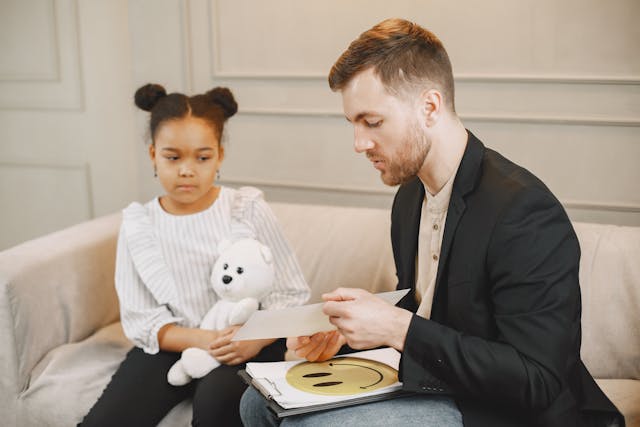What is Empathic Listening?
Empathic listening entails fully engaging with a speaker, not just understanding their words but also comprehending their underlying emotions, thoughts, and feelings. It requires active listening abilities, in which the listener is fully present and engaged, connecting with the speaker's emotions through verbal and nonverbal indicators such as body language and facial expressions. This strategy improves the listening experience by allowing the listener to understand the speaker's message and feelings appropriately. This can be especially important in therapy and counseling work.
Qualities of an empathic listener
An empathic listener demonstrates strong communication skills by being fully present, carefully observing nonverbal cues, and understanding the other person's perspective without letting their emotions interfere.
Empathic listening abilities include being attentive to your client or patient's emotions, employing empathic listening strategies such as mirroring facial expressions, and responding in a way that allows the speaker to feel heard. However, when forced or insincere, empathy can make the client feel misunderstood, transforming a beneficial conversation into a dishonest one.
Five empathic listening techniques
Empathic listening requires specific techniques that help empathic listeners fully connect with the client's emotions and perspectives. These techniques enhance the listening experience by ensuring the listener is fully present and responsive to the speaker's message and feelings.
1. Maintain eye contact
Making eye contact shows that you are fully present and engaged, encouraging the client to share their thoughts and feelings. It also helps you observe the client's facial expressions and nonverbal cues, which are crucial for understanding their emotions.
2. Mirror body language and facial expressions
By subtly mirroring the client's body language and facial expressions, you demonstrate that you are tuned in to their emotions. This technique enhances empathetic listening by fostering a deeper connection and making them feel understood.
3. Avoid interrupting and listen carefully
Allow the client to express their full message without interruptions. This shows respect for the client's emotions and ensures that you capture the entirety of their thoughts and feelings before responding.
4. Use verbal affirmations
Simple verbal affirmations like "I understand" or "That sounds difficult" validate the speaker's feelings and show that you are actively listening. This reinforces your empathic listening skills by acknowledging the client's emotions and encouraging further sharing.
5. Reflect and paraphrase
After the client finishes, reflect on what you heard in your own words, focusing on their emotions and key points. For example, saying, "It sounds like you're feeling frustrated because of the lack of communication," shows that you have listened carefully and grasped their emotions and message.
Why practice empathic listening?
Practicing empathic listening goes beyond just hearing words. It involves active listening, where an empathic listener genuinely engages with the speaker's thoughts and feelings. Empathetic Listening creates a safe space where clients feel comfortable sharing openly without fear of judgment.
This approach encourages good listeners to avoid making assumptions and instead employ questioning techniques, such as open-ended questions, to better understand the speaker's perspective. Empathy at the core of a conversation leads to stronger relationships, as the speaker asks questions or shares thoughts, knowing they are truly being heard and valued.
Benefits of empathic listening
Empathic listening offers numerous benefits, both in personal and professional interactions. It ensures the speaker feels heard and understood. Empathic listeners create a supportive environment that fosters open communication.
Builds trust and rapport
Giving your full attention and responding with empathy creates a sense of trust, making clients feel supported and valued.
Enhances understanding
By focusing on all aspects of the conversation, including emotions and points of view, empathic listeners can fully understand the client's message and respond more effectively.
Encourages openness
Empathic listening creates a safe space where individuals feel comfortable speaking openly and sharing personal thoughts, knowing they will be heard without judgment.
Improves communication skills
Practicing this skill helps listeners become more attentive and open-minded, allowing them to engage more deeply and imagine the client's experiences and emotions.
Facilitates problem-solving
By hearing and understanding the client's concerns without making assumptions, empathic listeners can offer more helpful and relevant support, leading to more effective problem-solving.
Consequences of lack of empathic listening skills
When empathic listening skills are lacking, communication can suffer, leading to misunderstandings and strained relationships. Without active listening and attention to nonverbal cues, essential aspects of a conversation may be missed, resulting in adverse outcomes.
- Increased misunderstandings: Without active listening and empathy, you may misinterpret the client's message, leading to confusion and frustration in the conversation.
- Poor conflict resolution: A lack of understanding and empathy makes it harder to resolve conflicts effectively, as key emotions and perspectives may be overlooked.
- Weakened team dynamics: When clients feel unheard, they may become disengaged, reducing collaboration and weakening the overall team environment.
- Missed nonverbal cues: Ignoring nonverbal cues, such as body language and facial expressions, can lead to a failure to grasp the full meaning behind a person's words, impacting your ability to be a better listener.
- Reduced trust and rapport: Without using questioning techniques and showing genuine interest, the client may feel undervalued, leading to a breakdown in trust and rapport.
Main takeaways
Empathic listening is important for improving communication because it allows people to interact completely and comprehend each other's feelings and viewpoints. Active listening, paying attention to nonverbal signs, and responding empathetically can help build stronger relationships, improve dispute resolution, and create a welcoming environment for open and meaningful talks.
Mastering this skill improves your ability to listen. It promotes better teamwork and deeper connections, resulting in more positive and productive interactions in both personal and professional situations.






.jpg)



.jpg)




.jpg)
.jpg)

.jpg)

.jpg)


.jpg)


